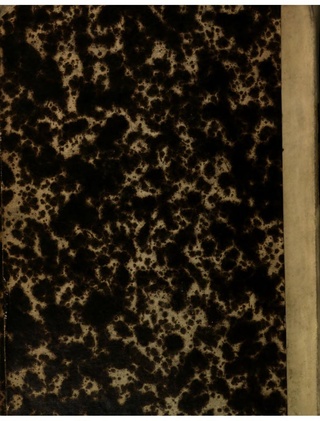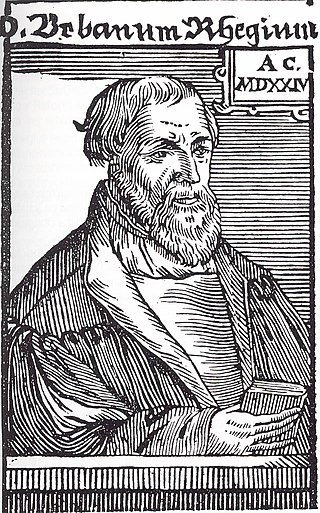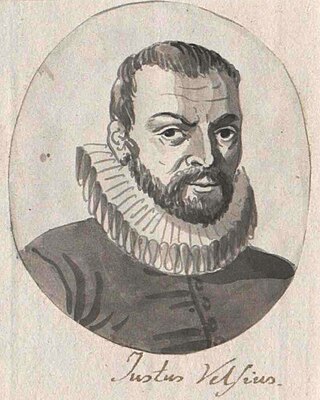
Johann Reuchlin was a German Catholic humanist and a scholar of Greek and Hebrew, whose work also took him to modern-day Austria, Switzerland, and Italy and France. Most of Reuchlin's career centered on advancing German knowledge of Greek and Hebrew.

In the scholastic system of education of the Middle Ages, disputations offered a formalized method of debate designed to uncover and establish truths in theology and in sciences. Fixed rules governed the process: they demanded dependence on traditional written authorities and the thorough understanding of each argument on each side.
Josel of Rosheim was the great advocate ("shtadlan") of the German and Polish Jews during the reigns of the Holy Roman Emperor Maximilian I and Charles V. Maximilian I appointed him as governor of all Jews of Germany, a position which was confirmed after his death by his grandson, Charles V.

Josippon is a chronicle of Jewish history from Adam to the age of Titus. It is named after its supposed author, Josephus Flavius, though it was actually composed in the 10th century in Southern Italy. The Ethiopic version of Josippon is recognized as canonical by the Ethiopian Orthodox Tewahedo Church and the Eritrean Orthodox Tewahedo Church.

Johannes Pfefferkorn was a German Catholic theologian and writer who converted from Judaism. Pfefferkorn actively preached against the Jews and attempted to destroy copies of the Talmud, and engaged in a long running pamphleteering battle with humanist Johann Reuchlin.

Paul Fagius was a Renaissance scholar of Biblical Hebrew and Protestant reformer.
Johann Peter Spaeth, also known as Moses Germanus or Moses Ashkenazi was an Austrian theologian that converted to Judaism.

Filippo Archinto (1495–1558), born in Milan, was an Italian lawyer, papal bureaucrat, bishop, and diplomat. He served as Governor of Rome and then papal Vicar of Rome. He was personally esteemed both by the Emperor Charles V and by Pope Paul III. He was Bishop of Borgo San Sepolcro (1539–1546), Bishop of Saluzzo (1546–1556), and Archbishop of Milan (1556–1558).
Joseph ben Shem-Tov ibn Shem-Tov was a prolific Judæo-Spanish writer born in Castile. He lived in various cities of Spain: Medina del Campo de Leon (1441); Alcalá de Henares (1451); and Segovia (1454).

Menahem ben Benjamin Recanati was an Italian rabbi who was born and died in the city of Recanati, who devoted the chief part of his writings to the Kabbalah.

David ibn Merwan al-Mukkamas al-Rakki was a philosopher and controversialist, the author of the earliest known Jewish philosophical work of the Middle Ages. He was a native of Raqqa, Mesopotamia, whence his surname. Harkavy derives his byname from the Arabic "ḳammaṣ", interpreting it as referring to his asserted change of faith. This is uncertain. The name is written "אלקומסי" in Masudi's Al-Tanbih, in a Karaitic commentary to Leviticus, and in a manuscript copy of Jefeth's commentary to the same book, and is perhaps a derivative from the city of Ḳumis in Taberistan. Another Karaite bears the name "Daniel al-Ḳumisi," and in Al-Hiti's chronicle this name is also spelled with a ẓade.

Paul of Burgos was a Spanish Jew who converted to Christianity, and became an archbishop, Lord Chancellor, and exegete. He is known also as Pablo de Santa Maria, Paul de Santa Maria, and Paulus episcopus Burgensis. His original name was Solomon ha-Levi.
A Christian Hebraist is a scholar of Hebrew who comes from a Christian family background/belief, or is a Jewish adherent of Christianity. The main area of study is that commonly known as the Old Testament to Christians, but Christians have occasionally taken an interest in the Talmud, and Kabbalah.
Religio licita is a phrase used in the Apologeticum of Tertullian to describe the special status of the Jews in the Roman Empire. It was not an official term in Roman law.
Christian Kabbalah arose during the Renaissance due to Christian scholars' interest in the mysticism of Jewish Kabbalah, which they interpreted according to Christian theology. It is often transliterated as Cabala to distinguish it from the Jewish form and from Hermetic Qabalah.

Urbanus Henricus Rhegius or Urban Rieger was a Protestant Reformer who was active both in Northern and Southern Germany in order to promote Lutheran unity in the Holy Roman Empire. He was also a popular poet. Martin Luther referred to him as the "Bishop of Lower Saxony".

The history of the Jews in Regensburg, Germany reaches back over 1,000 years. The Jews of Regensburg are part of Bavarian Jewry; Regensburg was the capital of the Upper Palatinate and formerly a free city of the German empire. The great age of the Jewish community in this city is indicated by the tradition that a Jewish colony existed there before the common era; it is undoubtedly the oldest Jewish settlement in Bavaria of which any records exist.

Celio Secondo Curione was an Italian humanist, grammarian, editor and historian, who exercised a considerable influence upon the Italian Reformation. A teacher in Humanities, university professor and preceptor to the nobility, he had a lively and colourful career, moving frequently between states to avoid denunciation and imprisonment: he was successively at Turin, Milan, Pavia, Venice and Lucca, before becoming a religious exile in Switzerland, first at Lausanne and finally at Basel, where he settled. He was famous and admired as a publisher and editor of works of theology and history, also for his own writings and teachings, and for the wide sphere of his friendships and correspondence with many of the most interesting reformists, protestants and heretics of his time, though his energetic influence was at times disruptive. The imputation of antitrinitarianism is very doubtful. Curio published under the Latin form of his name, but scholarship has adopted the Italian form.

Justus Velsius, Haganus, or Joost Welsens in Dutch, was a Dutch humanist, physician, and mathematician.

Johann Jakob Fugger or Hans Jakob Fugger was a German banker and patron of the arts and sciences from the von der Lilie line of the noted Fugger banking family.













